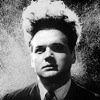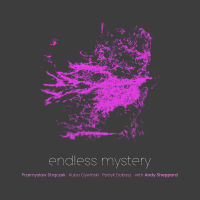Home » Jazz Articles » Genius Guide to Jazz » Dr. Strangehead, or How I Learned to Stop Worrying and L...
Dr. Strangehead, or How I Learned to Stop Worrying and Love Ken Burns
Wynton at last came into his own as jazz's foremost figure; equal parts cheerleader, oral historian, artist, educator, and vodka with a dash of Angostura bitters, Worcestershire sauce, and a pearl onion.
 Properly, the Roundheads were supporters of Parliament during the English civil war. They were opposed by loyalists to King Charles I, known as Cavaliers. I was a supporter of Parliament right up until Bootsy Collins left the group, but as a native Virginian, I am also inclined to support the Cavaliers. Never mind that I live in a part of the Commonwealth generally loyal to the Virginia Tech Hokies; and myself attended Virginia Commonwealth University, home of the Rams.
Properly, the Roundheads were supporters of Parliament during the English civil war. They were opposed by loyalists to King Charles I, known as Cavaliers. I was a supporter of Parliament right up until Bootsy Collins left the group, but as a native Virginian, I am also inclined to support the Cavaliers. Never mind that I live in a part of the Commonwealth generally loyal to the Virginia Tech Hokies; and myself attended Virginia Commonwealth University, home of the Rams. None of which matters.
 Wynton Marsalis, whose head couldn't get any rounder if Charles Schultz himself had drawn it with a compass, and who is known for his somewhat cavalier attitude, was born on October 18, 1961, in New Orleans. His father, renowned jazz musician and educator Ellis Marsalis, named him after pianist Wynton Kelly (who himself, oddly enough, was named after obscure New Orleans tambourinist Marsalis Wynton). While it might be said that jazz was in young Wynton's blood from birth, the DNA testing required to confirm that statement wouldn't become a practical reality for another thirty years.
Wynton Marsalis, whose head couldn't get any rounder if Charles Schultz himself had drawn it with a compass, and who is known for his somewhat cavalier attitude, was born on October 18, 1961, in New Orleans. His father, renowned jazz musician and educator Ellis Marsalis, named him after pianist Wynton Kelly (who himself, oddly enough, was named after obscure New Orleans tambourinist Marsalis Wynton). While it might be said that jazz was in young Wynton's blood from birth, the DNA testing required to confirm that statement wouldn't become a practical reality for another thirty years.
 In the meantime, young Wynton (not that one, the first one) grew up in a household surrounded by jazz. His older brother Branford took up the saxophone at an early age, and younger brother Delfeayo found the trombone to his liking. Six year-old Wynton was given a trumpet by his father?s employer, the famed trumpeter Al Hirt. At first, Wynton was not interested in the instrument, preferring instead to pursue his acting career. Few people know that he originated the role of Franklin in those great Charlie Brown specials of the sixties, and was the only cast member who did not need to be animated.
In the meantime, young Wynton (not that one, the first one) grew up in a household surrounded by jazz. His older brother Branford took up the saxophone at an early age, and younger brother Delfeayo found the trombone to his liking. Six year-old Wynton was given a trumpet by his father?s employer, the famed trumpeter Al Hirt. At first, Wynton was not interested in the instrument, preferring instead to pursue his acting career. Few people know that he originated the role of Franklin in those great Charlie Brown specials of the sixties, and was the only cast member who did not need to be animated.
Only four more Charlie Brown-related gags to go, kids. Collect the whole set.
![]() At the age of 12, Wynton heard the music of John Coltrane. How he managed to go 12 years without hearing Coltrane in a house full of jazz is beyond me, but we?ll let that go for the time being. The important thing is that he did hear Coltrane, and it filled him with such an overwhelming passion for jazz that he dedicated himself to studying and practicing his instrument from then on. I personally believe his discovery of Trane was in fact all part of an overall scheme to nail Frieda, whose naturally curly hair had been fueling his pubescent fantasies since Play It Again, Charlie Brown (1971).
At the age of 12, Wynton heard the music of John Coltrane. How he managed to go 12 years without hearing Coltrane in a house full of jazz is beyond me, but we?ll let that go for the time being. The important thing is that he did hear Coltrane, and it filled him with such an overwhelming passion for jazz that he dedicated himself to studying and practicing his instrument from then on. I personally believe his discovery of Trane was in fact all part of an overall scheme to nail Frieda, whose naturally curly hair had been fueling his pubescent fantasies since Play It Again, Charlie Brown (1971).
I disavow any and all knowledge of that last paragraph.
As a teenager, his thing for Frieda still unconsummated despite the magic of Coltrane's sax, Wynton turned his energies to playing classical music as so many young boys often do(?). By the time he was 14, he was already playing with the New Orleans Civic Orchestra, and attracting the attention of prestigious music programs from all over the country. Branford and he also formed a funk band, making my Parliament reference from the first paragraph seem eerily prescient now that you think about it.
 After high school, the world was Wynton's oyster. The Tabasco? sauce on that oyster was a scholarship to the renowned Tanglewood Music Center in Boston. And while most young people in his position would simply have eaten that oyster then and there with some French fries and a few beers, Wynton took it a step further. He decided to make Oysters Rockefeller, using New York's prestigious Juilliard School as the spinach and Paremsan cheese. Upon graduation, he realized that even Oysters Rockefeller weren't intended as entrees and in spite of his thusfar charmed life, he was still hungry.
After high school, the world was Wynton's oyster. The Tabasco? sauce on that oyster was a scholarship to the renowned Tanglewood Music Center in Boston. And while most young people in his position would simply have eaten that oyster then and there with some French fries and a few beers, Wynton took it a step further. He decided to make Oysters Rockefeller, using New York's prestigious Juilliard School as the spinach and Paremsan cheese. Upon graduation, he realized that even Oysters Rockefeller weren't intended as entrees and in spite of his thusfar charmed life, he was still hungry.
Enter Art Blakey, a hard-drinking, two-gunned U.S. marshal with hide tough as leather and a heart as big as Texas.
No, wait. Apparently, my computer is infected with the Louis L'Amour virus, which randomly Westernizes text in Microsoft Word, pardner. It?s still better than the sensuous, swollen, creamy, heaving Danielle Steele virus I had last year.
 Meanwhile, back at the Ol' Drinking G Ranch.
Meanwhile, back at the Ol' Drinking G Ranch.
Enter Art Blakey, the veteran drummer who had been at the helm of the Jazz Messengers since the 1950?s. The group was a de facto jazz boot camp, a working apprenticeship, meant to train young musicians and then send them out to make their own contributions to the music. Blakey and company had pioneered a style called Hard Bop, which sought to bring the black audience back to jazz by creating a melodic blues- and gospel-influenced sound with a more driving, straightforward rhythm.
Blakey also created Soft Bop, which used foam rubber instruments so that the kids could play jazz indoors without breaking anything. It never caught on, stylistically, but the concept was later sold to the Hasbro toy company and renamed Nerf. The royalties from this discovery kept Blakey in gravy until his death in 1990. And on a side note, it should be stated that in no way can Blakey be held responsible for the incredibly Nerf-like Kenny G, who himself should be repeatedly hard bopped.
And now back to our story.
Fresh from college, his unabated desire for Frieda now fueled by all those damned oysters, the Jazz Messengers provided Wynton an outlet for his energies. For eighteen months, Wynton honed his chops with Blakey and learned many important lessons about the very nature of jazz and its place in the American experiment that he has not been able to shut his gob about ever since.
Be that as it may.
 Leaving the Jazz Messengers for a recording contract with Columbia Records, Wynton was given unprecedented freedom to pursue both his jazz and classical passions. It may be no coincidence that Columbia Records was once the parent company of CBS, who you may know as the network that was the home of—that's right, kids—all those Charlie Brown specials. It is not known if his contract included a Frieda clause, but judging from his prolificacy from that point on, it's apparent somebody must've jiggled his handle, if you know what I'm saying. Because I sure as hell don't.
Leaving the Jazz Messengers for a recording contract with Columbia Records, Wynton was given unprecedented freedom to pursue both his jazz and classical passions. It may be no coincidence that Columbia Records was once the parent company of CBS, who you may know as the network that was the home of—that's right, kids—all those Charlie Brown specials. It is not known if his contract included a Frieda clause, but judging from his prolificacy from that point on, it's apparent somebody must've jiggled his handle, if you know what I'm saying. Because I sure as hell don't.
In 1982, he released one classical and two jazz albums and in '83 became the first artist ever to win Grammy's for both genres in the same year. Fortunately, his awards were from traditional categories in which the Academy of Recording Arts and Sciences actually has some credibility. If you'll remember the Grammy's that year, Culture Club won Best New Artist and Michael Jackson walked away with an armload of statuettes, one of which I just purchased on eBay. It?ll look great on my desk next to Whoopi Goldberg's Oscar.
 With his recording career securing his fame, Wynton set about remaking himself as an ambassador of jazz. He even purchased a 1967 Rambler Ambassador for the gig, but found it far too unreliable for the important job of taking jazz to the people. Plus, it only had an AM radio and he had all he could stand of sports call-in shows and country music. So he decided that instead of driving around the country, introducing people to jazz and occasionally solving mysteries with the aid of his magic trumpet, it might be better for all concerned simply to start a repertory concert series at the Lincoln Center. The prestige associated with the venerable institution, combined with the fact that Lincoln just made better cars than the old Rambler, led to the creation of a comprehensive department of jazz that now exceeds the shoe department in overall profit margins for the Lincoln Center.
With his recording career securing his fame, Wynton set about remaking himself as an ambassador of jazz. He even purchased a 1967 Rambler Ambassador for the gig, but found it far too unreliable for the important job of taking jazz to the people. Plus, it only had an AM radio and he had all he could stand of sports call-in shows and country music. So he decided that instead of driving around the country, introducing people to jazz and occasionally solving mysteries with the aid of his magic trumpet, it might be better for all concerned simply to start a repertory concert series at the Lincoln Center. The prestige associated with the venerable institution, combined with the fact that Lincoln just made better cars than the old Rambler, led to the creation of a comprehensive department of jazz that now exceeds the shoe department in overall profit margins for the Lincoln Center.
Not content to rest on his laurels, if indeed one could rest on those pointy-leaved plants from whence we get bay leaves, used as a seasoning in cooking. Although, I guess you could use them to make comfort food such as gumbo, which Wynton would later use as a metaphor to describe the confluence of ingredients that created jazz. And if you think we're up to the part about Ken Burns, I'll thank you to just sit back in your seat, let Uncle Genius drive, and quit hitting your sister.
 Through the nineties, Wynton dedicated himself to the cause of furthering jazz education by helping to develop a range of aids from competitions to clinics to a "scared straight" program that showed young musicians the awful consequences of playing in top-forty cover bands. He also broadened his compositional efforts to include extended jazz and classical pieces, music for small ensembles, and even scores for ballets. His 1996 oratorio "Blood on the Fields" won a Pulitzer Prize with a time of 2:56:18, almost six minutes better than his nearest competitor. It was the first jazz composition to win the prestigious award, and Wynton was also the first jazz composer to win the esteemed Pillsbury Bake-Off with his delightful blackberry popovers.
Through the nineties, Wynton dedicated himself to the cause of furthering jazz education by helping to develop a range of aids from competitions to clinics to a "scared straight" program that showed young musicians the awful consequences of playing in top-forty cover bands. He also broadened his compositional efforts to include extended jazz and classical pieces, music for small ensembles, and even scores for ballets. His 1996 oratorio "Blood on the Fields" won a Pulitzer Prize with a time of 2:56:18, almost six minutes better than his nearest competitor. It was the first jazz composition to win the prestigious award, and Wynton was also the first jazz composer to win the esteemed Pillsbury Bake-Off with his delightful blackberry popovers.
As the new millennium dawned, Wynton became involved in a project by horrifyingly earnest documentarian Ken "And Miles of Film to Go Before We Sleep" Burns. The twenty hour film, entitled simply Jazz (after PBS nixed the original title, Topless Karate Death Chicks 4), took upon itself the momentous task of telling the story of jazz all the way from Louis Armstrong and Duke Ellington to Duke Ellington and Louis Armstrong. Wynton provided both light and depth to the project, at last coming into his own as jazz's foremost figure; equal parts cheerleader, oral historian, artist, educator, and vodka with a dash of Angostura bitters, Worcestershire sauce, and a pearl onion.
That last sentence seems to have gotten sideways on me but to hell with it, we're almost home.
 Which brings us to the here and now. Unlike most of the profiles I've undertaken, Wynton hasn't been undertaken. Which is to say, he is still very much alive and active. In fact, he recently joined with father Ellis and brothers Branford, Delfeayo, and Jason (a talented drummer), for a celebration of both jazz's place in American history and culture, and their own enviable contributions to both. Earlier this year, the five Marsalises (Marsalii?) completed an eight-city tour that culminated in a 114-85 win over the Rippingtons featuring Russ Freeman at point guard.
Which brings us to the here and now. Unlike most of the profiles I've undertaken, Wynton hasn't been undertaken. Which is to say, he is still very much alive and active. In fact, he recently joined with father Ellis and brothers Branford, Delfeayo, and Jason (a talented drummer), for a celebration of both jazz's place in American history and culture, and their own enviable contributions to both. Earlier this year, the five Marsalises (Marsalii?) completed an eight-city tour that culminated in a 114-85 win over the Rippingtons featuring Russ Freeman at point guard.
 In the final analysis, Wynton Marsalis in his ascendancy reigns as a polarizing figure both to jazz and to American culture in general. Love him or hate him, you can't ignore him. His influence and contributions are undeniable; just you try to deny them and you'll hear from the authorities, I guarantee it.
In the final analysis, Wynton Marsalis in his ascendancy reigns as a polarizing figure both to jazz and to American culture in general. Love him or hate him, you can't ignore him. His influence and contributions are undeniable; just you try to deny them and you'll hear from the authorities, I guarantee it.
As for Frieda, she is married with two children, still possesses naturally curly hair, and declined to be interviewed for this piece.
Till next month, kids, exit to your right and enjoy the rest of AAJ.
![]()
Kids, be the first one on your block to know when the Genius Guide to Jazz will be available in convenient book form! Send your name to Your Own Personal Genius to be added to the Heads-Up List.
Tags
PREVIOUS / NEXT
Wynton Marsalis Concerts
Support All About Jazz
 All About Jazz has been a pillar of jazz since 1995, championing it as an art form and, more importantly, supporting the musicians who make it. Our enduring commitment has made "AAJ" one of the most culturally important websites of its kind, read by hundreds of thousands of fans, musicians and industry figures every month.
All About Jazz has been a pillar of jazz since 1995, championing it as an art form and, more importantly, supporting the musicians who make it. Our enduring commitment has made "AAJ" one of the most culturally important websites of its kind, read by hundreds of thousands of fans, musicians and industry figures every month.



















